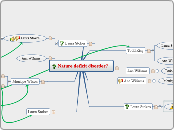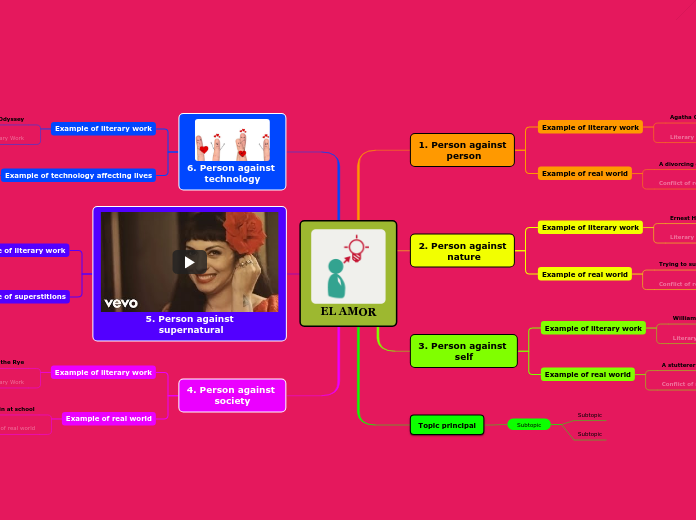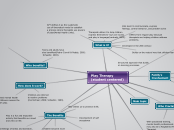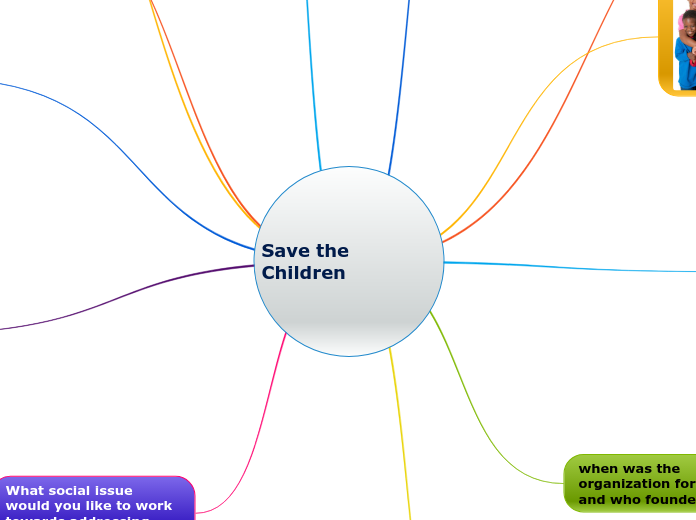Nature deficit disorder?
Nature deficit disorder?
The focus of this module is on simulations and science learning. In this week's discussion, you'll be carefully considering what Richard Louv has to say about this issue. He's coming at the issue from a slightly different angle than you might expect. Instead of taking a side on whether simulations are realistic or not, Louv is concerned about whether our children have enough opportunity to interact with the natural world. Specificially, he thinks today's children and their parents may suffer from "nature deficit disorder." What is this disorder? What are the causes? And, how does Louv's position inform your thoughts about the use of Internet simulations to learn science?
One thing I wanted to mention was the idea of the "news and media spooking parents with reports of child abductions and murders". I am not sure how I feel about this because on the one hand, there appear to be more children abducted than before. I know it is decreasing, but I mean before as in before Television and video games ruled the children's world. It seems that we are living in different times now and that means taking precautions. It is scary to be able to go to websites like Meganslaw.com and see where the child predators live and to know that they might be in your neighborhood. It weighs a lot on a parent's mind, and really I can't blame them. Part of raising children is keeping them safe.
On the other hand, I feel that some parents have taken it to the extreme and have tried to eliminate any possible chance for their child to be abducted by not allowing them to bikeride around their neighborhood, or go play in the woods with friends. When it comes down to it, I feel it is laziness on the parent. They could allow their child to participate in those activities as Louv mentioned, by accompanying them. They would get them out of the house and out of the environment where they were simply sitting around excercising their thumbs, vs. taking a look at nature and getting some actual sunlight. In Growing Up Denatured there was a quote by Ms. Herzog. She said " The temptation is to let the TV or PlayStation baby-sit them". This is the dirty truth. While parents may have their children's best interest in heart, they also have their own interests at heart as well, and taking 30 minutes to go on a bikeride with your child after a long day at work may be too much for parents. Yet, they won't allow their children out to do it on their own, so what happens? The children turn to something else indoors and "safe" such as TV or video games.
I really think a lot of these articles seem to be geared towards parents because we want what is best for our children, but at the same time it is going to come at the expense of our time and some people just aren't willing to accept that.
The topic is Nature deficit disorder, which Richard Louv comments on NPR news that society is indirectly saying to kids, "natures in the past and the future is with electronics". This means that kids are not playing outside and discovering the world like they were before electronics like video games, and the internet came available. Louv says the causes are the parents essentially, as we take them from sport to sport and the sole experience they have outside is going from one event to another. An assumption is that many parents are too worried to have their kids running outside by themselves. They would rather the video games “baby sit” their kids. He explains ideas further in his book, Saving Kids from "Nature Deficit Disorder".
I don’t think Louv has changed my views on how simulations can help students learn Science. He has just confirmed my thoughts. I think balance is the key, which I would have to assume Louv would agree with. Louv stated in NPR news that one doesn’t use all the senses when working with technology. This is same argument I had this past week about simulations. They are a great resource, but I think teachers should use simulations as a tool to help students learn Science but not the only means. Students benefit from using their 5 senses, which can’t be attained in a simulation. Nature is all around us and students can’t grasp concepts in Science unless they have had experiences outside seeing, touching, hearing, feeling, and tasting the world around them. Simulations should build on these experiences not try to replace them.
Monique I agree with you that we need to balance the use of hands on and simulation experiences. While some simulations would serve well to support, reinforce, and provide additional review of concepts first learned with hands on activities, I can also see how using a simulation to introduce the concepts would be an excellent way to prepare a student for a more successful hands on experience. I am thinking that frog dissections would be a good example of this.
I agree with what you have said Monique about needing there to be a balance between simulations and the real thing. One of the concerns I have with this is the fact that most of the video games and tv shows that kids have and watch are anything but nature related. There are some wonderful games and activities online which allow children to experiment nature, but the majority of kids woudl rather play their wrestling or car stealing video games than to actually experience the nature related videos and experiences the computer has to offer. I think this is really where parents become involved in making those decisions about how they want to raise their kids. To some ( and this goes back to another post I made) but to some, it is more important to have the "babysitter" and they don't really care what it is as long as the kids stay out of their hair. This is sad, but it is true. Some of the science related things I was talking about online may interest kids enough to say " Hey mom or dad, look what I found" thus forcing the parents out of their solitude to go and see what their child needs, vs. the video game that sucks them in and they have no need for their parents at that direct time. I ersonally would like to say that more parents would want their kids to have the nature activities and simulations on tv or the computer, but I really feel that most wouldn't for the above reaon.
But back to what you have said, if parents could help to allow for that balance in their children's lives they would be helping them in such a huge way. I just fear that many won't.
As a teacher, I have found that many students have a lack of imagination. I remember that I used to LOVE to write stories and illustrate my own books. I knwo that this type of activity doesn't always interest every kid, but I work with first graders and I have really seen a lack of imagination. Even in the last few years. There are always a few kids that still amaze me, but the majority of students that I come into contact with today seem to have a very minimal imagination. Do you notice the same thing?
I do notice the same thing Laura. We didn't have a lot of toys to play with growing up so we were ALWAYS using our imagination to create games, tell stories etc.
On Fridays, I have FREE Write, instead of a mini-lesson and a writing activity I plan for them. They love this as it gives them a chance to write about whatever they want. I think we have to purposely integrate activities in our classrooms that encourage imagination and creativity. I can only speak for myself, but I am always trying to fit these activities in and have a hard time when I feel so pressured to teach the immense amount of content material in all the subjects at the same time. What a balance it is!
When Louv was talking about parents fears about their child being abducted, he suggested that one way to move beyond that fear is for parents to send their child out in the woods with a cell phone. I did not think this was a good suggestion. If someone was lurking in the woods waiting to abduct a young child, I am sure they would be able to over power the child and get the phone away from them. Another concern with the cell phone idea, is that cell phones don't always work well when deep in the woods. The best answer is for parents to put their own consuming thoughts and activities on hold and go spend some quality time accompanying their child/children for some outdoor time with nature.
Richard Louv is concerned about a condition that he feels children suffer from, and he named it "nature deficit disorder. He feels that children are spending too much time indoors engaging in various forms of screen time, or being carted around for sports activities, music lessons, etc. to the point where they are not getting out and interacting with nature and the environment around them.
I agree with him that children are not having enough time outdoors exploring the natural world around them. He feels that one of the causes is because parents have the "bogeyman in the woods" fear that someone might abduct their child. I agree with Louv that children are not spending enough time outdoors interacting with nature and the environment around them. I guess I would say that after reading his article, it just confirms for me how I feel about the use of simulations for learning. As Louv suggests, it is hard to match the kind of learning that takes place for children when they use their five senses to explore the world around them. With this in mind, I feel that the most ideal situatioin for students would be to have a balance of hands on learning and learning through simulation. I don't think we can replace hands on learning with simulation. I do think that in cases where students are unable to have the hands on experiences, then simulations would at least provide them with certain types of learning that they wouldn't have otherwise.
Ann,
I agree that you need to use your sences. How does a simulation smell, or feel. One must get dirty with nature to really experience it. some things our sences just cannot get from a simulation.
What is "Nature Deficite Disorder"?
Good question. I believe that according to Mr. Louv, this disorder is about kids sitting too much in front of the computer or the TV playing games and not going outside for some fresh air.
Mr. Louv's states that he thinks this is because of parents being afraid to send thier kids outdoors without being with them. Abduction and kidnapping rund wild. This as Louv puts it is the boogyman.
As I stated on the frog simulation, i believe that simulation can be a good thing but not the only thing. There is a lot that we can lear from simulations. I has been mentioned that a simulation can help us learn and see the rain forest. This is true. An actual trip to the rain forsst is very expensive and not everyone could afford an actual visit. This simulation would allow us to learn about the science, the plants, and the animals, that call the rain forest home. So this is a good example.
An example of where a simulation in science is not to be the only way to learn, would be medical school. Simulation would be a very good way to begin and learn all the parts of the body and how the systems interact. However, it should not end here. To be a doctor, one needs to actually deal with a paitent. To feel and to touch, only in this methodology will you know what a muscle is supposed to feel like.
Todd I like your two examples for using simulations. I agree that there are some situations where simulations would provide students with learning experiences about a place where they wouldn't be able to take a field trip to, therefore allowing them to learn about that place in way that they would be able to experience otherwise.
I mentioned something similar about medical students and human biology majors in our frog dissection discussion. I think that it would be an excellent idea for these students to begin by learning through simulaltion, and then they would be more prepared and hopefully less anxious when they go to actually work on cadavers to continue their study of human anatomy.
I agree with you completely Todd. I think that Louv really made a point about the fact that kids are not spending enough time outdoors becuase of many distractions. Some being that they would rather play video games in doors or watch T.V. But then you take into account the kids that actually do want to go outdoors and who have parents who are being very protective. I am scared that I will be one of those parents because I am scared of what things are out there for kids. Being a teacher, especially of younger students, I know that there are things that make me nervous about the kiddos in my class. Walking home by themselves in the first grade scares me to death knowing that there are things that can happen. Not necessarily child abductions but even getting hit by a car. That is a worry that has evolved because getting run over by a car was far less likely when cars were not as common as they are today. Ok, well I am rambling, and that was not my point.
I also agreed with your idea that simulations are a necesitiy for science learning. Especially when you compared the idea to a Dr. When they get trained, you want them to learn the parts without having to be the guinea pig they learn on. How are they ever going to learn the basics with no one to practice on. There are only so many things you can to a cadaver over and over before it becomes used and no longer useful. A simultaion offers a chance to become familira with something before being given the real thing. It can be very beneficial to a student to practice that way without feeling the pressure of making a mistake. Understanding that mistakes will happen but with a simulation you get the freedom to make it and learn from it so you don't make it on the real thing. Good point you brought up Todd!
Monique Wilson
Both of you talked about how simulations can be very benefical because they offer a practice situation before having to engage in a real situation that invovles all the senses, and where emotion will play a factor. I started thinking about my inquiry project as I read both of your statements. I am having students do a simulation that has them look at the different body parts of a human and compare it to a dolphin. This simulation gives them an experience which they wouldn't get in a real life experience. Simulations offer experiences I wish I had as a student.
Monique, I agree that the simulation that you are going to use with your student for comparing a human and a dolphin will provide them with an experience that they would get through book learning. I too would have enjoyed having the learning opportunities that these simulations have to offer when I was a young student. Aren't you excited that we are learning about these opportunities and can begin exposing our students to these additional learning experiences!
I am EXCITED! The resources that are at our finger tips today are amazing! It will be interesting to see how students do this year with unit tests compared to last year without using simulations and my NEW projector in my room:-)
EXACTLY! I think this almost takes us back to the Frog dissection discussion because one of the points I made was that the simultaions offer experiences that children might otherwise miss out on if they are in a school that can't afford the hands on activities. I think hands on is very beneficial, but when it gets down to it, if the choice is simultaion vs. no experience at all, I would be all for simulation!
Laura Stokes
One thing I was curious about was why do children stay indoors all of the time. When I was younger, it was because of the fact that there wasn't as much to do indoors for me. I wasn't allowed to watch tv until later, we didn't have video games to play with. Our computer was ancient with no Internet or games on it so outside offered more of an opportunity for us to have some fun.
Do you think that if parents made a decision to take those items away that children would find the outdoors more enjoyable?
I don't think parents necessarily need to take the T.V. and video/computer games away from their child. I think they need to have rules that include a balance of indoor and outdoor time. They need to set a limit for total screen time per day, and include non-screen, outdoor and indoor activity time each day. I also think parents need to participate more in all of these activities with their child, rather than using various activities as a "baby sitter" like Louv stated.
After I posted I had somewhat of an idea. I think that in a way it would make children enjoy the outdoors more. I know there are some parents who don't have that fear of losing their child to abduction or murder, adn therefore the outdoors are not off limits to their children, however their children still choose to play indoors because they, as parents, allow it. I think this can be becuase of their peers. Their peers may have parents who do not allow them to play utside for one fear or another, and therefore their entertainment comes from things inside, wether it be tv, video games etc. They may discuss that in school... " I got to such and such level what level have you goten to". A response such as " Oh we got our video games taken away and had to play outside instead" might cause some issues for the child within school. I am not saying parents shouldn't take those things away, but I think that perhaps even doing that may not allow children to have more fun.
On the other hand, I think it could allow them to enjoy outdoors more, and perhaps tell their video game playing friends how much fun they are having outside. Letting them know about the snake they caught or the lizard they saw, or how they caught fish in the pond behind their house. Once peers accept your activities, it is almost like a non spoken agreement has been made that those acitvities are OK and you are still "cool" if you do them. I know acceptance is especially importnant in middle ages where kids are trying to fit in. Maybe not quite as much later on, because older kids tend to gravitate towards crowds of people that enjoy the same things they do, so this idea of judgmenet wouldn't be as big of an issue. I may be wrong but these just seem to be observations I have made around kids.
Monqiue Wilson
Ann, I thought your point about parents being busy on their computer sends a mesage to their children to play with their tech toys. How can we expect them to want to go outside and play if we don't ourselves.
Todd, I too have thought about the tracking system you stated that people put in their pets. OR do we parents, just need to be more aware of where our children are at all times, and keep close to them. It's hard to do this when they are with other people :-(
Laura, I agree that peer pressure is a factor for sure! Students talk at school about the levels they are on and when they get to play. Children don't realize that some kids don't have to put as much effort in school as others to do well, and they think they can keep up with their friends even though they are not doing well in school.
Todd Ring
Laura,
Yes, the new media is pushing it too far and making parents scared. From Meganslaw and the website that you can find people in you neighborhood i think is a 2 sided blade. I wanted to know, to put my mind at ease and know who may be living nearby. My wife did not even want to know. She was going to be over protective of the kids no matter what (not that that is a bad thing) but just did not care to know the who in the neighborhood.
A thought that i have had in the past, but my kids are too old now, was to equip them with low jack. You can have this done to your pet, so why not to your small children. If something bad happended you could eaisly find them.
Thanks for listening.
Ann Williams
I think that the child's attitude about spending time outdoors reflects the attutude that their parents have. If their parents share an enthusiasm and wonder about nature and the world around them, and guide their child in a variety of exciting activities outdoors, then the child will pick up on that and follow their lead, developing a sense of wonder and awe that matches or surpasses that of their parents. I still think that if a child is having high quality experiences outdoors with or without their parents, these experiences are going to rank at the top of their list of fun things to do. I think some parents still do provide their children with these experiences and we need them to help bring some of the other parents along by inviting their family to join them on a hike in the woods, fishing at the lake or pond, visiting the local nature center, etc...
Your thoughts on peer pressure are definitely worth considering, and I think do have some bearing on things.I also just had another thought about why young families aren't spending much time outside. Not only are children having too much screen time, adults are too. Time seems to disappear quickly when we are checking and responding to e-mail, interacting on facebook, read various blogs, playing various online games, etc. When the kids are staying busy with T.V., video games, computer games, then parents have more time for getting lost in their own computer related activities.









